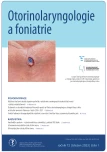-
Medical journals
- Career
Myiasis of the ear as a rare cause of otorrhea
Authors: I. Kalivoda; J. Syrovátka; K. Zogatová
Authors‘ workplace: Oddělení ORL a chirurgie hlavy a krku, Nemocnice AGEL Nový Jičín a. s.
Published in: Otorinolaryngol Foniatr, 72, 2023, No. 1, pp. 39-42.
Category: Case Reports
doi: https://doi.org/10.48095/ccorl202339Overview
Myiasis – infestation of tissues by fly maggots is a relatively rare disease in our country, rarer still is a solitary affliction of the ear. The case we report is of a patient who was diagnosed with and treated for ear myiasis. Ear myiasis should be included in the differential diagnosis of otorrhea, especially in patients with low socioeconomic status.
Keywords:
otalgia – myiasis of the ear – otomyiasis – otorrhea – maggots – poor hygiene
Sources
1. Al Jabr I. Aural Myiasis, a Rare Cause of Earache. Case Rep Otolaryngol 2015; 2015 : 219529. Doi: 10.1155/2015/219529.
2. Bhatt AP, Jayakrishnan A. Oral myiasis: a case report. Int J Paediatr Dent 2000; 10 (1): 67–70. Doi: 10.1046/j.1365-263x.2000.00162.x.
3. Mengi E, Demirhan E, Arslan IB. Aural myiasis: case report. North Clin Istanb 2014; 1 (3): 175–177. Doi: 10.14744/nci.2014.96967.
4. Yuca K, Caksen H, Sakin YF et al. Aural myiasis in children and literature review. Tohoku J Exp Med 2005; 206 (2): 125–130. Doi: 10.1620/tjem.206.125.
5. Yazgi H, Uyanik MH, Yoruk O et al. Aural Myiasis by Wohlfahrtia magnifica: Case Report. Euras J Med 2009; 41 (3): 194–196.
6. Ahmad AK, Abdel-Hafeez EH, Makhloof M et al. Gastrointestinal Myiasis by Larvae of Sarcophaga sp. and Oestrus sp. in Egypt: Report of Cases and Endoscopical and morphological studies. Korean J Parasitol 2011; 49 (1): 51–57. Doi: 10.3347/kjp.2011.49.1.51.
7. Šuláková H, Gregor F, Ježek J et al. Nová invaze do našich obcí a měst: koutule Clogmia albipunctata a problematika myiáz. Živa 2014; (1): 29–32.
8. Francesconia F, Lupi O. Myiasis. Clin Microbiol Rev 2012; 25 (1): 79–105. Doi: 10.1128/ CMR.00010-11.
9. Khan I, Muhammad AY, Javed M. Risk Factors Leading to Aural Myiasis, J Postgrad Med Inst 2006; 20 (4): 390–399.
10. Cho JH, Kim HB, Cho CS et al. An aural myiasis case in a 54-year-old male farmer in Korea. Korean J Parasitol 1999; 37 (1): 51–53. Doi: 10.3347/kjp.1999.37.1.51.
11. Tománek R. Řídký případ ORL myiasy. Čs Otolaryngol 1956; 5 (3): 179–181.
12. Al-Abidi AA, Bello C, Al-Ahmari M et al. Mastoid cells myiasis in a Saudi man: a case report. West Afr J Med 2003; 22 (4): 366–368. Doi: 10.4314/wajm.v22i4.28069.
13. Werminghaus P, Hoffmann TK, Mehlhorn H et al. Aural Myiasis in a Patient with Alzheimer’s disease. Eur Arch Otorhinolarnyngol 2008; 265 (7): 851–853. Doi: 10.1007/s00405-007-0535-2.
14. Chaiwong T, Tem-Eiam N, Limpavithayakul M et al. Aural myiasis caused by Parasarcophaga (Liosarcophaga) dux (Thomson) in Thailand. Trop Biomed 2014; 31 (3): 496–498.
15. Marková M, Rozkošný R. Myiáza v ORL oblasti. Čs Otolaryngol 1984; 33 (4): 257–259.
Labels
Audiology Paediatric ENT ENT (Otorhinolaryngology)
Article was published inOtorhinolaryngology and Phoniatrics

2023 Issue 1-
All articles in this issue
- Editorial
- An accuracy of whisper hearing test together with screening otoacoustic emissions in the detection of hearing loss
- Experience with secondary voice prostheses implantations at the Department of Otorhinolaryngology and Head and Neck Surgery at the Olomouc University Hospital in 2016–2021
- Functional evaluation of laryngoscopic examination and its relation to voice quality and voice range profile parameters
- Heerfordt’s syndrom – a rare manifestation of sarcoidosis from an ENT perspective
- Schwannoma of the mastoid part of the facial nerve
- Myiasis of the ear as a rare cause of otorrhea
- Sedmdesátiny doc. MUDr. Jana Vokurky, CSc.
- Kurz „Chirurgie kůže hlavy a krku pro pokročilé“
- Multidisciplinárny Workshop Dysfágia
- XIX. česko-slovenský kongres mladých otorinolaryngológov
- Otorhinolaryngology and Phoniatrics
- Journal archive
- Current issue
- Online only
- About the journal
Most read in this issue- Experience with secondary voice prostheses implantations at the Department of Otorhinolaryngology and Head and Neck Surgery at the Olomouc University Hospital in 2016–2021
- An accuracy of whisper hearing test together with screening otoacoustic emissions in the detection of hearing loss
- Functional evaluation of laryngoscopic examination and its relation to voice quality and voice range profile parameters
- Heerfordt’s syndrom – a rare manifestation of sarcoidosis from an ENT perspective
Login#ADS_BOTTOM_SCRIPTS#Forgotten passwordEnter the email address that you registered with. We will send you instructions on how to set a new password.
- Career

